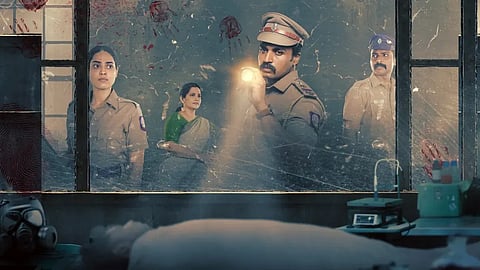Regai Series Review: This old-school whodunnit is mildly engaging
Regai Series Review(2.5 / 5)
Regai Series Review:
More than the plot, the warmth and thrill of reading a crime novel is an experience in itself. You immerse yourself in the story so much that you get silly enough to suspect simple things happening to you: a loud knock at your door or a call from an unknown number. But that is about a page-turner. The latest Zee5 series, Regai, based on popular Tamil crime novelist Rajesh Kumar's work, however, is not a page-turner. You can save the rest of the pages left to read the next day, but you also don't want to leave it halfway.
Atypical of Rajesh Kumar novels, the show begins with a death involving some science, and the crime takes place in a quaint town far away from Chennai, in Tirunelveli. The lovelorn Courtallam police inspector Vetri (Bala Hasan), who is waiting for his transfer to the bomb squad in Chennai, is ordered to pursue this case. The case is also personal for him, as he has mentored the murder victim in his studies. His investigation, vis-à-vis finding the culprit, also reveals more about the victim and a chain of more deaths.
For some strange reason, Tamil web series creators, especially the crime/supernatural series creators, are attracted to what Tamil movie distributors call the TTK region (Tirunelveli, Thoothukudi, and Kanniyakumari). Regai's choice of location doesn't put you off because it follows the Tamil web series rulebook, as it also adheres to Rajesh Kumar's writing style of introducing crime incidents that happen in places like Hubli and Nashik to a Tamil reader. What doesn't sit pretty is the convenient switching between commonly spoken Tamil and Nellai Tamil. There is a palpable sense of anxiety to make the story look as Tirunelveli-esque as possible when some characters suddenly realise that they are supposed to say 'Kottikaaran' and not 'Paithiyakaaran'.
Cast: Bala Hasan, Ra Subakar, Pavithra Janani, Pushpavalli
Director: M Dhinakaran
Another fascinating thing about Regai is its reliance on things such as medical science and human behaviour. This decision effectively does away with technology like CCTV and GPS trackers used as a writing crutch. There are, of course, CCTV and GPS, but these gadgets more or less just act as a confirmation of Vetri's hunch about something/someone. The semi-urban/rural setting also helped create stumbling blocks to the investigation. In a particular scene, Vetri, in an important place related to the crime, finds that there is just one CCTV camera in the street, and its angle doesn't favour the investigation. How engaging the bridging of this gap is is a different question altogether, but it was refreshing to see cops pushed to utilise their mental faculties when technology fails them. What was also refreshing, though old, was to see a cop noticing the expressions and reactions of people upon saying things and joining the dots thereafter. The series also makes decent use of chemistry that would make Rajesh Kumar proud of. The professions shown in the series aren't superficially handled. A pivotal piece of information about the functioning of a mortuary adds to a twist in the screenplay.
The aspect that did not get a smooth page-to-screen transition was the detailing. There is a plot, there are multiple subplots, and a side to someone that is revealed, and several other sides are shrouded. The series gets so indulgent in the details that it gets lost in them. The series suffers as we struggle to remember who is who. As we are introduced to each victim, midway into the series, we juggle between trying not to forget which story belongs to which victim while also trying not to miss the investigation parts.
But that is not the biggest grouse about Regai. It is that the makers want you to believe a far-fetched theory, which, if you don't, shakes the very foundation of the plot. The theory of why Vetri wasn't wary about the crime when he could have nipped it in the bud doesn't hold water. Though the series is exciting in parts despite becoming predictable towards the end and being able to spot the final twist from afar, the earlier-said theory makes it uncomfortable to embrace the show completely. Except for bringing back the old-fashioned whodunnit elements and some engaging stretches, such as victim introductions and usage of professions to drive the plot, Regai fails to leave a lasting imprint.

